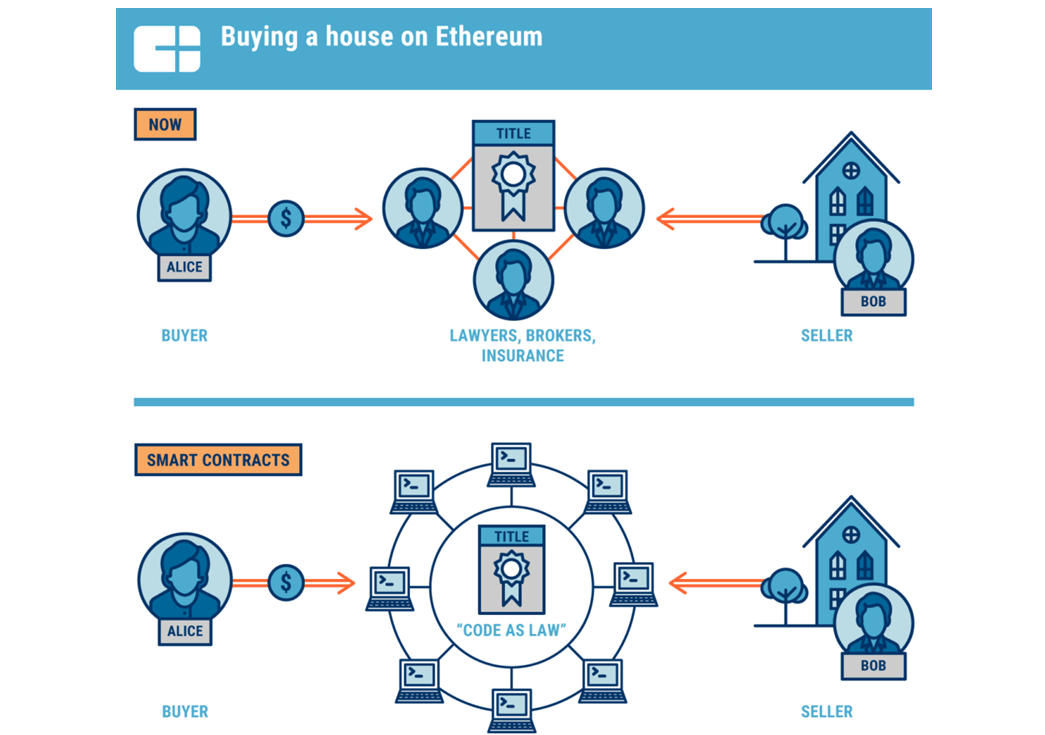 Blockchain technology has the potential to revolutionize the real estate sector, from property trading to land registry process, diligence, and quick settlements.Real estate is one of the significant assets in the world. The survey done by Grand View Research says that the global real estate market is estimated to reach a revenue of $4,263.7 billion USD by 2025. However, citizens in developed countries like the USA lost approximately $150 million because of real estate scams in 2018. Though a lot of technology advancements have been made to overcome real estate scams and disputes, no technology solution has been found capable of completely doing so. If you would try to relate real estate with blockchain, you won’t find any relation at first. But when we look at the possibilities that blockchain can bring, blockchain for real estate tends to be the next step in the revolution of the real estate industry.
Blockchain technology has the potential to revolutionize the real estate sector, from property trading to land registry process, diligence, and quick settlements.Real estate is one of the significant assets in the world. The survey done by Grand View Research says that the global real estate market is estimated to reach a revenue of $4,263.7 billion USD by 2025. However, citizens in developed countries like the USA lost approximately $150 million because of real estate scams in 2018. Though a lot of technology advancements have been made to overcome real estate scams and disputes, no technology solution has been found capable of completely doing so. If you would try to relate real estate with blockchain, you won’t find any relation at first. But when we look at the possibilities that blockchain can bring, blockchain for real estate tends to be the next step in the revolution of the real estate industry.  In this article, we will discuss how blockchain can help overcome the problems faced by the real estate industry currently. We will map challenges faced by the industry with blockchain solutions.
In this article, we will discuss how blockchain can help overcome the problems faced by the real estate industry currently. We will map challenges faced by the industry with blockchain solutions.
Here are some of the issues faced by the real estate industry and why it requires a blockchain solution:
Lack of Transparency
The real estate market is filled with too many intermediaries who always wish to make a profit. Every intermediary involved in the process has a business model that they remain biased towards, as the deal can make them gain profits. They usually prefer to restrict options so that they are only available to sellers from whom they can make more benefits.
Lack of Liquidity
The issue of liquidity has existed in the real estate industry for a long time. Liquidity is termed as how rapidly any asset can be transformed into cash. The reasons why real estate properties are not as liquid as cryptocurrencies are because:
- The user base for buying cryptocurrencies is large than that for real estate.
- Crypto assets can be sold quickly by getting listed on public exchanges.
Also, entering real estate trading is quite costly because of the presence of intermediaries in the ecosystem.
Reliability
You might know how online scams can affect real estate traders. Imposters can deceive buyers into buying a property that is not even available for sale using their attractive website. Buyers may not be educated enough to perform background checks of the middlemen in the real estate ecosystem. It leads to a lot of legal issues and a loss of money. >> Binance Makes Investment in Chinese Crypto Media Firm Mars Finance
Correctness
Forged documents play a crucial role in deceiving buyers and convincing them to purchase illegal property. Morphing applications can edit the entire image of a person. Such software can make it possible to edit the text in a physical document. These documents can be any bank-related statements or property papers.
Here’s how implementing blockchain in real estate can offer benefits:
Process of Searching Properties
Nowadays, brokers, owners, tenants, and buyers access and upload property listings via a third-party property listing platform.
Most of these platforms are subscription-based and request high fees from users. Also, the current process lacks standardized processes and has poor communication between the platforms. Besides, the data on third-party property platforms is fragmented across multiple listing sites, leading to data silos. Blockchain can solve this issue by providing a single decentralized database to maintain the property listing. Since the data is distributed across a peer-to-peer network, brokers would have control over the data. All stakeholders of the platform can access the information without being able to manipulate it.
Property Management
Property management is complicated and involves multiple stakeholders, including property managers, vendors, landlords, and tenants. Many properties are either handled offline via paperwork or by software applications that cannot be integrated. With a decentralized application that uses smart contracts, the process of property management, from managing cash flow to signing lease documents and submitting maintenance requests, can be performed in a secure yet transparent way. For instance, tenants and landlords could sign an agreement added to smart contracts that includes information like rental value, property, tenant details, and payment frequency. Once the terms are agreed upon, lease payments are automatically initiated from the tenant to the landlord using smart contracts. Upon the lease period termination, the security amount is also sent back to the tenant’s account automatically. Implementing blockchain into property management can help to bring such a transformation.
Financial Evaluation and Due Diligence
Paper documents for identity proof still exist in the market nowadays. It requires a significant effort and time to perform financial verification and due diligence. Since it is a manual verification process, it also increases the chances of errors and usually involves third-party service providers. Such factors lead to additional costs and consume a lot of time in due diligence. With digital identities on the blockchain, the whole process can be done online in a secure way. As a result, it improves efficiency, cuts down costs, reduces the risk of manual errors, and enhances data security. For example, information like financial and legal status, vacancy, and performance metrics of a person can be associated with their digital identity, streamlining the process of property trading while adding layers of security. All parties involved in property management would have their own digital identities. Everyone can use the property management application to send and sign property documents using smart contracts.
Land Registry
The process of a land registry currently involves middlemen who hold information that nobody else can access. The implementation of blockchain in the land registry could transform the process by allowing anyone to access and save information without the involvement of the third party. Blockchain could also solve fraud issues by allowing everyone to access land title records while maintaining the immutability of land records. With the timestamped and immutable record of transactions, you have full control over your land title and forged documents become a thing of the past. >> Ripple Soars 15% Suddenly, Other Cryptos Follow
Takeaway
Blockchain has the potential to bring transparency, enhance efficiency, and cut down costs for real estate investors by eliminating inefficiencies from key processes. This article was curated through CryptoCurrencyNews’ Contributor Program. If you would like to write for us, send us your submission! Featured image: DepositPhotos © sdecoret
|
|


Leave a Reply
You must be logged in to post a comment.